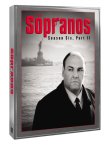| Reviews & Columns |
|
Reviews DVD TV on DVD Blu-ray 4K UHD International DVDs In Theaters Reviews by Studio Video Games Features Collector Series DVDs Easter Egg Database Interviews DVD Talk Radio Feature Articles Columns Anime Talk DVD Savant Horror DVDs The M.O.D. Squad Art House HD Talk Silent DVD
|
DVD Talk Forum |
|
|
| Resources |
|
DVD Price Search Customer Service #'s RCE Info Links |
|
Columns
|
|
|
Sopranos - Season Six, Part 2, The
THE SHOW:
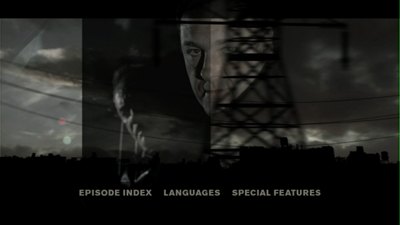
For the better part of eight years, The Sopranos has been riding high as America's favorite television family. Representing part of our collective mythology, of immigrant stories and outlaws and the struggles to make one's way in a crumbling American Dream, mob boss Tony Soprano and his clan were the heart of one of the most involving dramas to ever be on television. Infused with the poetry of the streets, full of jokes both risqué and uncomfortable, and bubbling along on an undertow of violence, The Sopranos was an epic novel told as episodic TV. It redefined what audiences came to expect in their home viewing and even set the precedent for how television ultimately made its way to DVD.
For me, The Sopranos always seemed to be a house divided unto itself, a hybrid of the modern family soap opera and gangster movie tropes that made its sausage from the prickly juxtaposition of the two. It's those two things I kept in mind as I watched the final nine episodes for the second time, now packaged together as four DVDs under the banner of Season Six, Part 2. The series hasn't always maintained its balance well, having seasons that leaned heavily toward the mob (Three) and then others that swung back toward the family (Four and Five). From my observation, the fans of the show often fell on either side of that split, as well. Some preferred seeing guys getting whacked to Tony and Carmella's domestic strife, missing that the worst violence was often inflicted on loved ones in ways that didn't involve a gun or a blunt instrument--but then sometimes also did.
There is no avoiding this harrowing truth in Season Six, Part 2, and it's the essential ingredient that makes the conclusion of The Sopranos so tantalizing, so rich, and so very filling. Show creator David Chase was faced with creating one of the most anticipated send-offs in the history of the medium, and from where I'm sitting, he more than met the challenge.
Be forewarned. From this point forward, I will be discussing what happens in Season Six, Part 2 at length. If you have not seen this season and have somehow avoided all of the arguing and gnashing of teeth that surrounded the last episode, then stop reading now. I'm not sure what you're doing here anyway. If you've seen the preceding six DVD sets, do you really need to be convinced to see this through? If you've never watched the show before, why start here? Anyway, don't say I didn't warn you.
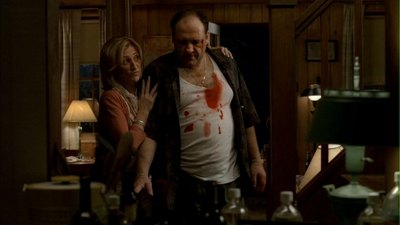
Chase begins the season with his thematic statement. Episode 1, "Soprano Home Movies," lays out everything that this last run will be concerned with. Tony (James Gandolfini) and Carmella (Edie Falco) go on a country getaway for Tony's birthday, joining his sister Janice (Aida Turturro) and her husband Bobby (Steve Schirripa) at their cabin by the lake. Bobby is also one of Tony's trusted soldiers, and the two have business across the Canadian border to take care of.
Feeling his age, Tony reflects on his mortality, reaching out to his friend and considering the consequences of the lifestyle they have chosen. This trip down memory lane turns disastrous, however, when a little alcohol is poured over the raw nerves. Tony offends Bobby with his off-color jokes about Janice, and the two men get into a brutal fistfight. Tony gets his butt handed to him, and the beating loosens a screw or two. Where there was once trust, there is now paranoia. The well-wishes he extended to Bobby are withdrawn, and instead he puts the man's loyalty to the test, sending him out on his first assassination.
Tony will put other members of his organization through similar tests throughout the season, questioning his trust in even his closest advisors. Some will pass, and some will fail. In this violent landscape, no one is safe. The past is ever-present and digging it up can cause no end of trouble--sometimes literally, as in episode 3, "Remember When." The demolition of a New Jersey home unearths the body of a bookie Tony killed in his 20s, his first-ever murder (an assignment echoing the task he gives to Bobby). Since Paulie Walnuts (Tony Sirico) was with him on that job, the two of them take a road trip to Florida to hide out until they know for sure they aren't going to be charged. The whole way, Paulie reminisces about old stories, getting on Tony's nerves and making the bossman wonder if maybe it wouldn't be easier to silence Paulie for good. Can such loose lips be expected not to sink ships? Even Paulie feels the sting of nostalgia, realizing that he is in the same exact position Big Pussy was in when he got capped way back in season 2, a moment that haunts the whole of The Sopranos, the point where the paranoia of betrayal first creeped in.
In keeping with his overriding theme of aging and change, Chase sets up several layers of the mafia family to play against each other. On one side, we have Uncle Junior (Dominic Chianese), the last survivor of the old generation, his mind deteriorating in a mental hospital; on the other, we have the sons of Tony's soldiers, the two Jasons, starting a new racket at the college level and kicking money back up to their elders. As youth, they understand the way the world is turning in ways that their elders do not, as seen in the older folks' confusion with advancing social mores and technology and how these youngsters help navigate the challenges and fold them into how they all do business. They are taking over for where Tony's nephew and one-time successor, Christopher (Michael Imperioli), went off the rails. Still struggling with alcohol and addiction, Christopher has distanced himself from the others, putting most of his energy into making the horror film Cleaver. It's a disappointment to Tony and likely influences why he is so determined to get his own son, A.J. (Robert Iler), off the couch and doing something with his life.
In between the older generation and the younger generation is the current heads of the family, three men who are advancing in years. Johnny Sack (Vincent Curatola) is exactly where Tony doesn't want to be: rotting in jail, dying of lung cancer. Phil Leotardo (Frank Vincent), on the other hand, is positioning himself to take over the seat of leadership Johnny Sack left vacant. A headstrong bully, he is the upsetter in terms of Tony's legacy. It's not even that Tony wants to be the big boss, it's more that Phil is determined to squeeze the Soprano crew until it bursts.
The best metaphor for Tony's struggle comes in episode 4, "Chasing It," which is also one of the best installments of The Sopranos in all six seasons. The title refers to what happens when a gambler perpetually loses. He starts throwing good money after bad, following every misfire with a bigger, crazier bet, trying to get back what he lost. This is Tony's driving psychosis in this final act: the worse it gets, the harder he fights to bring it together. Thus, the housecleaning and the vicious murders. For all of David Chase's affection for his lead character, he never wants us to forget the violence he is capable of. Despite the more heralded deaths in The Sopranos - Season Six, Part 2, the most cruel is the one that caps "Chasing It." It's all the more haunting for its ambiguity. We don't really know whether Tony had anything to do with it, but he is willing to capitalize on it regardless.
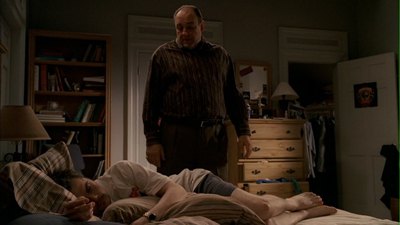
Since The Sopranos began as a drama about the head of a mafia family that also had to deal with his own nuclear family at home, it makes sense that David Chase would spend a lot of time in Season Six, Part 2 dealing with Tony's immediate relations. Though his wife and their children have had their ups-and-downs over the years, this season sees them pulling closer together. The criminal lifestyle that initially threatened to tear them apart is ultimately what tightens their bonds. The price on Tony's head and the loss of so many others forces them to look out for each other. Tony's idealistic daughter, Meadow (Jamie Lynn Sigler), even changes her career track after seeing her father consistently having his rights trampled by law enforcement. Is it possible to imagine that one day she will be a mob lawyer?
Anthony, Jr., who has always been kind of an ill-defined character, gets a lot of screen time in these nine episodes. He goes through a break-up, has a breakdown, emerges as a troubled scholar and wannabe activist, but is reborn yet again in a burst of flame. The accident of his truck catching fire shows him that he actually has a taste for destruction. He's not in the family business as of yet, an offer is laid out to him. Ironically, his pathway in could be the same path that took Christopher out of the mix. Tony gets him a job on a film production, and if A.J. can prove himself, the two might talk about further activities. Though, if A.J. does join his father's operation, it will be as a new generation, the first to see the big gaping hole in the American Dream, to realize that his opportunities are not everything they've been billed as.
All in all, the first eight episodes of The Sopranos - Season Six, Part 2 are up there with the best of the series. These chapters are thematically solid, with no missteps. David Chase is so locked into his goal, every detail only serves to add to the mounting tension. Even the karaoke songs that Janice and Carmella sing in episode 1, the Stones' "Out of Time" and "Love Hurts," serve as omens, warnings to Tony about where he's headed. Plenty of loose ends are also tied up, including the conclusion of Tony's therapy, which interestingly enough is instigated by his doctor (Lorraine Braco), who manages to be one of the only people to escape Tony's grasp unscathed. It all leads to the ending of episode 8 and one of the best cliffhangers in recent memory: James Gandolfini going to bed with an assault rifle, waiting for his enemies to come for him.
So, what of episode 9? Is all of this great build-up ruined in the last show?
Many would have you believe that it was, and I actually returned to Season Six, Part 2 with the opinion that that answer was both "yes" and "no," that some of it worked and some of it didn't--though, my problems were not with the hotly debated final shot, the smash cut that sent everyone in America rushing to their television sets wondering why the signal went out early. I still think it's one of the most brilliant endings I've ever seen. (Reminiscent, in its way, to Bret Easton Ellis' mid-sentence drop-off in his novel The Rules of Attraction, a choice retained by Roger Avary in his film adaptation.)
No, my original misgivings about episode 9, "Made in America," was that I didn't feel the pay-off of the previous episode's build-up was sufficient. That image of Tony and his rifle had created the expectation that there would be violent retribution on the horizon. Violence does come, but Tony isn't physically involved, and I thought that was a mistake. I felt the showdown with Phil should have been handled by Tony personally, or better yet, his confrontation with Junior should have been Tony's one last act of cleansing, of removing the final person close enough to damage him in the way only family can. Chase had spent so much of the preceding eight episodes reminding us of Tony's temper and his brutality, it seemed a little wrong to have him walk out of the scrape without dipping his hands in the blood.
I don't think that anymore. Watching the season straight through with few pauses between episodes always helps change my perspective, as does the removal of false expectations. By bringing an end to his enemies without dirtying his hands directly shows Tony's promotion to the ultimate seat of power and the success of his purging. He can now trust his knights to act on his behalf.
At the same time, by returning to his core unit to bolster his strength, Chase reminds us that Tony's love for his family is his greatest weakness. Yes, he could have killed his Uncle Junior, but instead Tony sees that his foe has been neutralized, and there is no further damage he can do. In fact, Junior's condition is more devastating to him than anything Tony could have done, and it breaks Tony's heart in return. Leaving the old man with tears in his eyes shows a compassion that the mob boss can't ever exorcise fully.
This is what makes the final scene in the diner so powerful. Despite gathering his wife and children to him, enjoying a traditional American meal in a traditional American diner amongst average people, Tony realizes that it never ends. He will always be a target, and he will always be paranoid about it. Any person in that restaurant could be his killer. The choice of Journey's "Don't Stop Believing" as the musical selection for the ending is ironic. Sure, Tony's willing to keep fighting, but with each victory, the threat will get larger. The life of a gangster is cyclical, following patterns of peace and war that will never be stopped, and though Tony will keep believing and keep fighting, every time the door opens, he's going to have to wonder if his death will be walking through it.
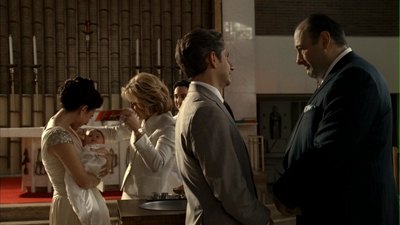
THE DVD
Video:
I am almost always pleased with HBO DVD sets, and given the importance of The Sopranos - Season Six, Part 2, it would have been a real tragedy if the quality of the discs was not up to snuff. Thankfully, HBO keeps their track record going. All nine episodes are shown in anamorphic widescreen, and the picture is as fresh-faced and lovely as the day it was first born. I had no problems with skipping discs, pixelation, or any other glitches. All four DVDs played perfectly from start to finish.
Sound:
The shows have an audio soundtrack mixed in 5.1. The tracks have really excellent sound levels, using all the speakers and keeping the various elements clear and distinct.
Extra options include a Spanish dub in 2.0, Closed Captioning, and subtitles in English, French, and Spanish.
Extras:
HBO has stuck with the same design for all seven of its Sopranos sets. The DVDs come in an outer box with a lid that lifts up, revealing a foldable book with plastic trays for each disc on the inside. The leaves of the book have photos and an episode by episode listing with titles, writing and director credits, and an index to special features.
For those who need refreshers for what has gone before. DVD 1 has trailers for the previous seasons, and each episode also has an optional "previously on" recap.
All four discs have one audio commentary each, featuring cast members who had an important role in the chosen episode. These are Steve Schirripa (Bobby) on episode 1, Dominic Chianese (Uncle Junior) on episode 3, Robert Iler (A.J.) on episode 7, and Stevie Van Zandt (Silvio) and Arthur Nascarello (Carlo Gervasi) on episode 8. These are decent though unspectacular commentaries. Chianese makes the interesting choice of doing portions of the commentary in character, where the Robert Iler track is pretty spotty, since he had never watched the finished episode before sitting down to talk about it.
DVD 4 has two documentaries. The 8 minute, 20 second "Making Cleaver" is a fun extra, featuring the actors in character as if they were shooting a real making-of for their fake movie. The illusion is a little ruined by actual clips from The Sopranos, but what are you going to do? Actors Danny Baldwin and Jonathan Lapaglia appear as themselves, just as they do in the show itself, since they are the actors in the fake Cleaver scenes.
"The Music of The Sopranos" is an 18 minute, 30 second documentary about how the excellent soundtrack was put together, how songs were chosen to go with specific scenes. An editor from Rolling Stone magazine interviews David Chase, Stevie Van Zandt, Dominic Chianese, and members of the crew to go over the process and examine specific scenes. It's a really good featurette, I could have even stood for it to be a little longer.
FINAL THOUGHTS:
When the history of television is written, The Sopranos will loom large in the narrative. This groundbreaking series changed how we watched television, how the stories were told and how the information was communicated to the audience. After eight years and essentially seven seasons, the inevitable end has finally come. Released as a boxed set of four DVDs, The Sopranos - Season Six, Part 2 chronicles the final chapter in the epic story of Tony Soprano and his family. Violence both emotional and physical punctuates the rise and fall of the ambitions of one clan, forcing them to question their choices and the things that bind them together. It doesn't get better than this, and it's always great to see a top-notch series retain its impeccable quality by leaving while the show can still be Highly Recommended. Better to go out guns blazing, when you can still challenge and surprise, then sink into blandness. The Sopranos - Season Six, Part 2 maintains its aim and obliterates every target in its sights.
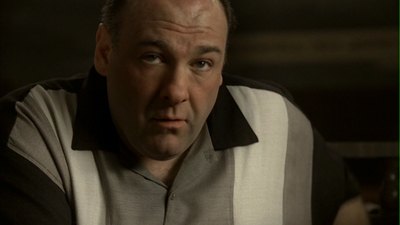
Jamie S. Rich is a novelist and comic book writer. He is best known for his collaborations with Joelle Jones, including the hardboiled crime comic book You Have Killed Me, the challenging romance 12 Reasons Why I Love Her, and the 2007 prose novel Have You Seen the Horizon Lately?, for which Jones did the cover. All three were published by Oni Press. His most recent projects include the futuristic romance A Boy and a Girl with Natalie Nourigat; Archer Coe and the Thousand Natural Shocks, a loopy crime tale drawn by Dan Christensen; and the horror miniseries Madame Frankenstein, a collaboration with Megan Levens. Follow Rich's blog at Confessions123.com.
|
| Popular Reviews |
| Sponsored Links |
|
|
| Sponsored Links |
|
|
| Release List | Reviews | Shop | Newsletter | Forum | DVD Giveaways | Blu-Ray | Advertise |
|
Copyright 2024 DVDTalk.com All Rights Reserved. Legal Info, Privacy Policy, Terms of Use,
Manage Preferences,
Your Privacy Choices | |||||||









